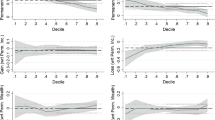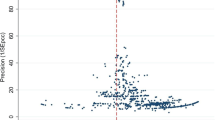Summary
Price Level Changes and Private Consumption: The Empirical Relevance of the Pigou-Effect in West-Germany. - In West-Germany price level fluctuations significantly influence real private consumption expenditures, in the manner suggested by Pigou in his famous attack on Keynes’ theory of employment. This is demonstrated by estimating three different groups of consumption models using one-stage least square techniques. The empirical relationship between price level changes and real consumption, however, is open to various theoretical interpretations: Besides the Pigou-effect proper a neo-classical cash balance effect, a price-illusion effect or a so-called negative-income effect may have been at work as well.
Résumé
Changements en niveau de prix et consommation privée: L’importance empirique de l’effet de Pigou en Allemagne de l’Ouest. — Les fluctuations en niveau de prix influencent significativement les dépenses réelles de consommation privée en RFA comme Pigou a présenté cette relation dans son attaque fameuse contre la théorie de l’emploi de Keynes. Pour l’analyse, trois groupes différents de modèles de consommation sont estimés utilisant des techniques des moindres carrés à un degré. La relation empirique entre les changements en niveau de prix et la consommation réelle implique, cependant, plusieurs interprétations théoriques: Sans parler de l’effet de Pigou propre un effet néo-classique de l’encaisse, un effet d’illusion de prix ou un effet soi-disant de revenu négatif peuvent Être aussi effectifs.
Resumen
Cambios en el nivel de precios y consumo privado: La relevancia empírica del efecto Pigou en Alemania Occidental. - Fluctuaciones en el nivel de precios afectan significativamente el gasto privado para fines de consumo de la manera sugerida por Pigou en su famoso ataque a la teoría del empleo de Keynes. Esto queda demonstrado estimando tres grupos diferentes de modelos de consumo utilizando el método de cuadrados minimos de una etapa. La relación empírica entre cambios en el nivel de precios y el consumo real, empero, se presta a varias interpretaciones teóricas: además del efecto Pigou, también otros efectos podrían haben estado actuando, como el de dinero efectivo neoclásico, el efecto de ilusión de precios o el así llamado efecto de ingreso negativo.
Similar content being viewed by others
Literatur
Buiter, Willem H., “Crowding Out’ and the Effectiveness of Fiscal Policy”.Journal of Public Economics, Vol. 7, 1977, S. 309–328.
Davidson, James E. H., David F. Hendry, Frank Sbra, Stephen Yeo, “Econometric Modelling of the Aggregate Time-Series Relationship between Consumers’ Expenditure and Income in the United Kingdom”.The Economic Journal, Vol. 88, 1978, S. 661–692.
Deaton, Angus, “Involuntary Saving through Unanticipated Inflation”.The American Economic Review, Vol. 67, 1977, S. 899–910.
Friedman, Milton, David Meiselman, “The Relative Stability of Monetary Velocity and the Investment Multiplier in the United States, 1897–1958”. In: Commission on Money and Credit (Ed.),Stabilization Policies. Englewood Cliffs, N. J., 1963, S. 165–268.
Gallaway, Lowell E., Paul E. Smith, “Real Balances and the Permanent Income Hypothesis”.Quarterly Journal of Economics, Vol. 75, 1961, S. 302–313.
Gurley, John G., Edward S. Shaw,Money in a Theory of Finance. Washington, D. C., 1960.
Hendry, David F, Thomas von Ungern-Sternberg, ⋯Liquidity and Inflation Effects on Consumers’ Expenditure”. In: Angus Deaton (Ed.), Essays in the Theory and Measurement of Consumer Behaviour. In Honour of Sir Richard Stone. Cambridge 1981, S. 237–260.
Hindley, Brian, Morris Perlman, “The Pigou Effect: An Elaboration”.Journal of Monetary Economics, Vol. 2, 1976, S. 409–417.
Johnson, Harry G., “Monetary Theory and Monetary Policy”.The American Economic Review, Vol. 52, 1962, S. 335–384.
Mishan, E. J., “A Fallacy in the Interpretation of the Cash Balance Effect”.Economica, Vol. 25, 1958, S. 106–118.
Neldner, Manfred, “Chronische UnterbeschÄftigung bei flexiblen Löhnen und Preisen? Einige kritische Bemerkungen zur theoretischen Relevanz des Pigou-Effekts”.Zeitschrift für die Gesamte Staatswissenschaft, Vol. 138, 1982, S. 695–710.
Pesaran, M. Hashem, R. A. Evans, “Inflation, Capital Gains and U. K. Personal Savings: 1953–1981”.The Economic Journal, Vol. 94, 1984, S. 237–257.
Pesek, Boris P., Thomas R. Saving,Money, Wealth, and Economic Theory. New York 1967.
Pigou, Arthur C., “Economic Progress in a Stable Environment”.Economica, Vol. 14, 1947, S. 180–188.
Tobin, James, “Keynesian Models of Recession and Depression”.The American Economic Review, Vol. 65, Papers and Proceedings, 1975, S. 195–202.
von Ungern-Sternberg, Thomas, “Inflation and Savings: International Evidence on Inflation-Induced Losses”.The Economic Journal, Vol. 91, 1981, S. 961–976.
About this article
Cite this article
Neidner, M. Preisniveauschwankungen und privater Konsum: Zur empirischen Bedeutung des Pigou-Effekts in der Bundesrepublik Deutschland. Weltwirtschaftliches Archiv 122, 533–551 (1986). https://doi.org/10.1007/BF02707378
Published:
Issue Date:
DOI: https://doi.org/10.1007/BF02707378




